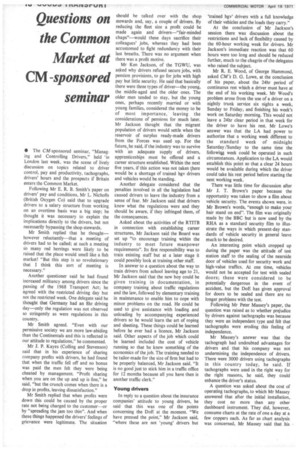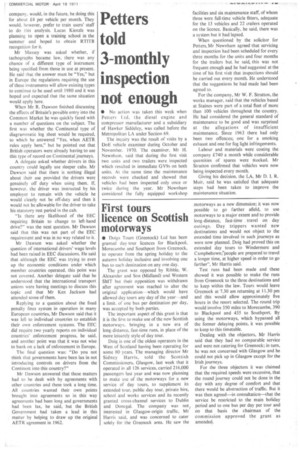Questions on the Common Market at CM-sponsored seminar
Page 20

Page 21

If you've noticed an error in this article please click here to report it so we can fix it.
• The CM-sponsored seminar, "Managing and Controlling Drivers," held In London last week, was the scene of lively discussion on topics related to driver control, pay and productivity, tachographs, drivers' hours and the prospects if Britain enters the Common Market.
Following Mr E. R. B. Smith's paper on drivers' pay and conditions, Mr L. Nicholls (British Oxygen Co) said that to upgrade drivers to a salary structure from working on an overtime basis was a big step; he thought it was necessary to explain the implications directly to the drivers, but not necessarily bypassing the Shop stewards.
Mr Smith replied that he thought— however reluctantly—that a meeting of drivers had to be called; at such a meeting so many red herrings were likely to be raised that the place would smell like a fish market! "But this step is so revolutionary that I think this sort of meeting is necessary."
Another questioner said he had found increased militancy among drivers since the passing of the 1968 Transport Act; he agreed with the .restricted driving day but not the restricted week. One delegate said he thought that Germany had an 8hr driving day—only the regulation was not observed so stringently as were regulations in this country.
Mr Smith agreed. "Even with our permissive society we are more law-abiding than the Continentals and this is reflected in our attitude to regulations," he commented.
Mr J. P. Kayes (Coiling and Stevenson) said that in his experience of sharing company profits with drivers, he had found that when the traffic fell off and no bonus was paid the men felt they were being cheated by management. "Profit sharing when you are on the up and up is fine," he said, "but the crunch comes when there is a drop in profits, leaving dissatisfaction."
Mr Smith replied that when profits were down this could be caused by the proper rate not being charged to the customer—or by "spreading the jam too thin". And when these things happened the drivers' feelings of grievance were legitimate. The situation should be talked over with the shop stewards and, say, a couple of drivers. By reducing the fleet size a profit could be made again and drivers—"fair-minded chaps"—would these days sacrifice their colleagues' jobs, whereas they had been accustomed to fight redundancy with their last breaths. There was no argument when there was a profit motive.
Mr Ken Jackson, of the TGWU, was asked why drivers refused secure jobs, with pension provisions, to go for jobs with high pay but little security. He said that basically there were three types of driver—the young, the middle-aged and the older ones. The older men tended to stay, but the young ones, perhaps recently married or with young families, considered the money to be of most importance, leaving the considerations of pensions for much later. Mr Jackson thought that the migrant population of drivers would settle when the reservoir of surplus ready-made drivers from the Forces was used up. For the future,,,he said, if the industry was to survive with an adequate supply of drivers, apprenticeships must be offered and a career structure established. Within the next five years, if this action was not taken there would be a shortage of trained hgv drivers and vehicles would be standing.
Another delegate considered that the penalties involved in all the legislation had caused drivers to leave the industry from a sense of fear. Mr Jackson said that drivers knew what the regulations were and they should be aware, if they infringed them, of the consequences.
Asked about the activities of the RTITB in connection with establishing career structures, Mr Jackson said the Board was set up "to encourage training within the industry to meet future manpower requirements". Its first responsibility was to train existing staff but at a later stage it could possibly look at training other staff.
In answer to a question about the way to train drivers from school leaving age to 21, Mr Jackson said that the new boy could be given training in documentation, in company training about traffic regulations and the law, followed by elementary training in maintenance to enable him to cope with minor problems on the road. He could be used to give assistance with loading and unloading by accompanying experienced drivers so he would learn the art of roping and sheeting. These things could be learned before he ever had a licence, Mr Jackson said. Other aspects of the job which could be learned included the cost of vehicle running so that he knew something of the economics of the job. The training needed to be tailor-made for the size of firm but had to be properly balanced, Mr Jackson said. "It is no good just to stick him in a traffic office for 12 months because all you have then is another traffic clerk."
Young drivers In reply to a question about the insurance companies' attitude to young drivers, he said that this was one of the points concerning the DoE at the moment. "We have pressed the point," Mr Jackson said, "where these are not 'young' drivers but 'trained hgv' drivers with a full knowledge of their vehicles and the loads they carry."
At the conclusion of Mr Jackson's session there was discussion about the restrictions and lack of flexibility caused by the 60-hour working week for drivers. Mr Jackson's immediate reaction was that 60 hours were too long and should be reduced further, much to the chagrin of the delegates who raised the subject.
Mr R. E. Wood, of George Hammond, asked CM's D. G. Lowe, at the conclusion of his paper, about the 24hr period of continuous rest which a driver must have at the end of his working week. Mr Wood's problem arose from the use of a driver on a nightly trunk service six nights a week, Sunday to Friday, and finishing his week's work on Saturday morning. This would not leave a 24hr clear period in that week for the driver to have his rest. Mr Lowe's answer was that the LA had power to authorize that a working week different to the standard week of midnight Saturday /Sunday to the same time the follow* week could be operated in such circumstances. Application to the LA would establish this point so that a clear 24 hours would be available during which the driver could take his rest period before starting the next working week.
There was little time for discussion after Mr J. T. Brown's paper because the opportunity was taken to show a film about vehicle security. The events shown were, in Mr Brown's words, "enough to make your hair stand on end". The film was originally made by the BBC but is now used by the RHA as a standard security film to illusstrate the ways in which present-day standards of vehicle security in general leave much to be desired.
An interesting point which cropped up during the paper was the attitude of test station staff to the sealing of the nearside door of vehicles used for security work and high-value traffics. At one time, vehicles would not be accepted for test with sealed doors; these were considered to be potentially dangerous in the event of accident, but the DoE has given approval for doors to be sealed and there are no longer problems with the test.
Following Mr Peter Massey's paper, the question was raised as to whether prejudice by drivers against tachographs was because they were an independent type and felt that tachographs were eroding this feeling of independence.
Mr Massey's answer was that the tachograph had undoubted advantages for drivers and that his company was not undermining the independence of drivers. There were 3000 drivers using tachographs in this country today, he said. If tachographs were used in the right way for the right reasons, he said, they could enhance the driver's status.
A question was asked about the cost of operating tachographs, to which Mr Massey answered that after the initial installation, they cost no more than any other dashboard instrument. They did, however, consume charts at the rate of one a day at a few coppers each. As far as chart analysis was concerned, Mr Massey said that his company, would, in the future, be doing this for about £4 per vehicle per month. They would, however, prefer to train users' staff to do this analysis. Lucas Kienzle was planning to open a training school in the summer and hoped to obtain RTITB recognition for it.
Mr Massey was asked whether, if tachographs became law, there was any chance of a different type of instrument being specified from those in use at present. He said that the answer must be "Yes," but in Europe the regulations requiring the use of these instruments will allow existing types to continue to be used until 1980 and it was hoped and expected that the same situation would apply here.
When Mr R. Dawson finished discussing the effects of Britain's possible entry into the Common Market he was quickly faced with a number of questions on the subject. The first was whether the Continental type of diagrammatic log sheet would be required, to which he answered "Yes, when AETR rules apply here," but he pointed out that British operators were already having to use this type of record on Continental journeys.
A delegate asked whether drivers in this country could legally use sleeper cabs. Mr Dawson said that there is nothing illegal about their use provided the drivers were genuinely off duty when using them. If, however, the driver was instructed by his employer to remain with the vehicle he would clearly not be off-duty and then it would not be allowable for the driver to take his statutory rest period in the cab.
"Is there any likelihood of the EEC requiring Britain to change to left-hand drive?" was the next question. Mr Dawson said that this was not part of the EEC requirement and was in no way related to it.
Mr Dawson was asked whether the question of international drivers' wage levels had been raised in EEC discussions. He said that although the EEC was trying to even up the economic conditions under which member countries operated, this point was not covered. Another delegate said that he understood that the international transport unions were having meetings to discuss this topic and that Mr Ken Jackson had attended some of them.
Replying to a 'question about the fixed penalty fines system in operation in many European countries, Mr Dawson said that it was left to individual countries to establish their own enforcement systems. The EEC did require two yearly reports on individual countries' enforcement progress, he said, and another point was that it was not wise to bank on a lack of enforcement in Europe.
The final question was: "Do you not think that governments have been lax in not introducing controls on drivers from the Continent into this country?"
Mr Dawson answered that these matters had to be dealt with by agreements with other countries and these took a long time. All countries wanted their own points brought into agreements so in this way agreements had been long and governments had been lax, he said, but the British Government had taken a lead in this matter hy helping to draw up the original AETR agreement in 1962.




























































































